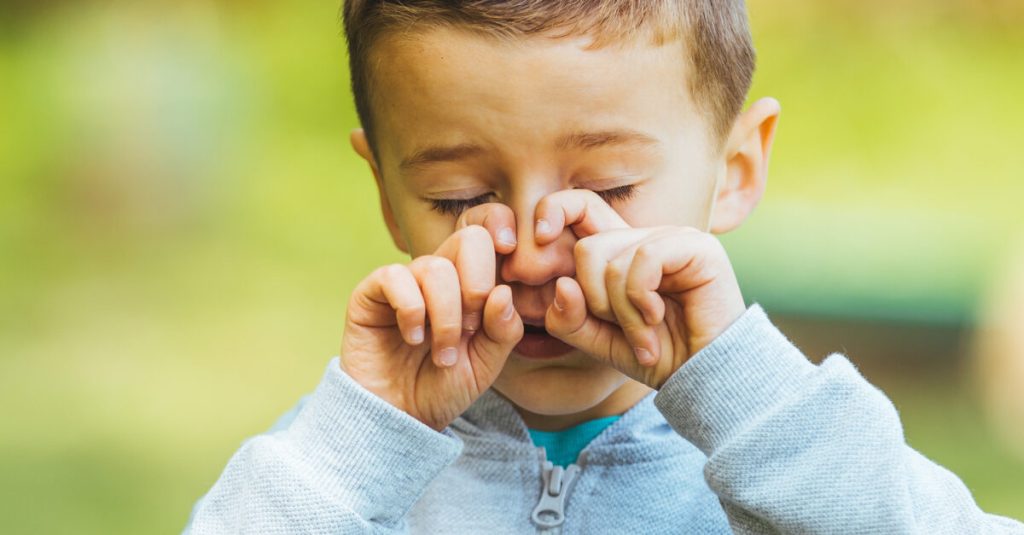Spring is in the air! Flowers bloom, warm sunshine returns, and children eagerly rush outdoors to play. But for many kids, this beautiful season also brings an unwelcome guest—seasonal allergies. Sneezing, congestion, watery eyes, and itchy throats can turn fun outdoor activities into a struggle.
Bayhealth Otolaryngologist (ENT) Dr. Catherine Wright emphasizes that managing seasonal allergies early can help children enjoy the season without discomfort. “A proactive approach is much better than a reactive approach,” says Dr. Wright. Identifying triggers and following effective preventive measures can help keep allergies at bay.

Understanding Seasonal Allergies in Children
What Causes Seasonal Allergies?
Seasonal allergies occur when the immune system overreacts to airborne allergens such as:
- Pollen (from trees, grass, and weeds)
- Mold spores
- Dust mites
- Pet dander
When children breathe in these allergens, their bodies release histamines, leading to allergy symptoms.
Signs and Symptoms of Allergies in Kids
Common symptoms of seasonal allergies include:
- Sneezing
- Stuffy or runny nose
- Itchy, red, or watery eyes
- Coughing
- Fatigue due to disrupted sleep
- Postnasal drip or sore throat
If your child experiences these symptoms consistently during specific seasons, they may have seasonal allergies.
Essential Tips to Help Your Child Through Allergy Season
1. Identify Allergy Triggers
Observing your child’s symptoms can help pinpoint what allergens affect them most. Keep track of when symptoms worsen—do they flare up after playing outside or during specific times of the day? Common seasonal allergens include:
- Spring: Tree pollen
- Summer: Grass pollen
- Fall: Ragweed pollen
- Year-round: Mold and dust mites
Consult an allergist for an allergy test to confirm specific triggers.
2. Monitor Pollen Counts Before Outdoor Play
Check your local weather forecast for pollen levels before sending kids outside. Pollen counts are typically highest:
- In the early morning (5 AM – 10 AM)
- On warm, dry, and windy days
- During peak spring and fall seasons
When pollen counts are high, encourage indoor activities or choose outdoor playtimes later in the evening.
3. Keep Indoor Air Clean
Reducing indoor allergens can help minimize symptoms:
- Use HEPA air filters to trap airborne allergens.
- Keep windows closed during high pollen days.
- Run an air purifier in your child’s room.
- Clean surfaces regularly to remove dust and pollen.
- Bathe pets frequently to prevent them from carrying pollen indoors.
4. Practice Good Hygiene After Outdoor Play
After playing outside, have your child:
- Wash their hands and face.
- Change into clean clothes.
- Take a quick shower to rinse off pollen.
- Frequently wash bedding and pillowcases to remove allergens.
5. Use Saline Nasal Sprays
A saline nasal spray helps flush out allergens from the nasal passages, preventing irritation and congestion. Steroid nasal sprays can also provide relief and are most effective when used before symptoms start.
6. Consider Antihistamines and Allergy Medications
If preventive measures aren’t enough, over-the-counter antihistamines can help manage symptoms:
- Children’s Zyrtec, Claritin, or Allegra can provide 24-hour relief.
- Antihistamine eye drops can soothe itchy, watery eyes.
- Consult a doctor for the best medication and dosage for your child.
For severe allergies, allergy shots (immunotherapy) may be an option to build long-term tolerance.
When to See a Doctor
If allergy symptoms persist despite preventive steps and medication, or if your child experiences difficulty breathing or severe congestion, consult a doctor. Allergy testing can help pinpoint specific allergens and develop a personalized treatment plan.
Frequently Asked Questions:
1. How do I know if my child has allergies or a cold?
Allergies typically cause sneezing, itchy eyes, and a clear runny nose but no fever, whereas colds often include a fever, body aches, and a thicker nasal discharge.
2. What’s the best way to prevent seasonal allergies in kids?
Avoid exposure to allergens by monitoring pollen counts, keeping windows closed, using air purifiers, and practicing good hygiene after outdoor play.
3. Can young children take allergy medication?
Yes, but always consult a pediatrician before giving your child antihistamines, nasal sprays, or any allergy medication.
4. When should I take my child to an allergist?
If your child’s allergy symptoms are persistent, severe, or not relieved by over-the-counter medications, an allergist can conduct tests to identify specific triggers and recommend targeted treatments.
5. Do kids outgrow seasonal allergies?
Some children may outgrow certain allergies, while others may continue experiencing symptoms into adulthood. Allergy shots (immunotherapy) can help reduce symptoms long-term.




